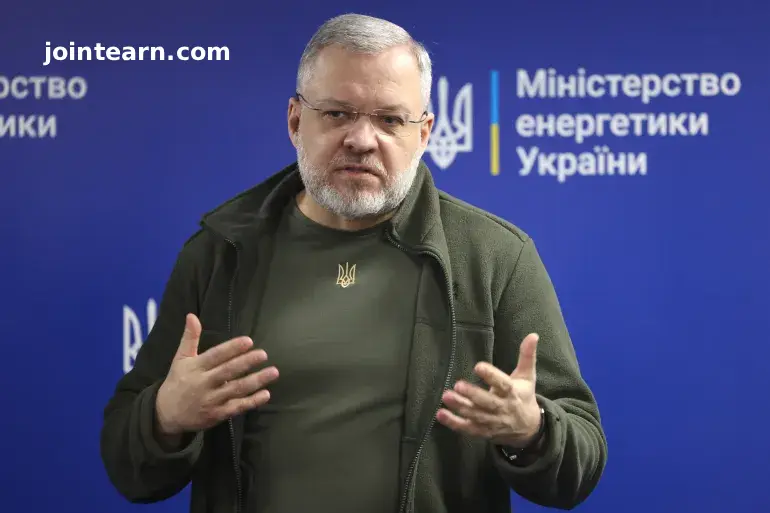
Two senior Ukrainian officials – Justice Minister German Galushchenko and Energy Minister Svitlana Hrynchuk – have resigned amid a sweeping $100 million corruption investigation tied to state nuclear power operator Energoatom.
The resignations come as President Volodymyr Zelenskyy intensifies his campaign to root out graft in Ukraine’s energy sector, an area already battered by relentless Russian air attacks on critical infrastructure.
High-Level Shake-Up in Kyiv Government
Ukrainian Prime Minister Yulia Svyrydenko confirmed on Wednesday that both ministers had “submitted their resignations in accordance with the law.”
The announcement followed President Zelenskyy’s public call for their dismissal, citing a loss of trust amid the corruption scandal.
“Corruption in the energy sector is absolutely unacceptable,” Zelenskyy said in a video address.
“The minister of justice and the minister of energy cannot remain in office. This is, among other things, a matter of trust.”
Both resignations mark the latest development in Ukraine’s continuing efforts to demonstrate transparency and accountability to international partners as it pursues European Union membership.
Inside the $100 Million Energoatom Corruption Scheme
The Specialised Anti-Corruption Prosecutor’s Office (SAPO) revealed earlier this week that investigators had uncovered an alleged $100 million kickback scheme involving Energoatom, Ukraine’s state nuclear energy enterprise.
According to prosecutors, businessman Timur Mindich, a close ally of President Zelenskyy, allegedly orchestrated a network that controlled procurement and contract awards within the energy sector.
Officials say that contractors were forced to pay bribes of 10–15 percent of contract values to secure deals or avoid payment delays. Five individuals have been detained, and two others remain at large.
SAPO claims that former and current energy officials were aware of the operation and may have helped channel illicit funds through shell companies tied to state enterprises.
Justice Minister Galushchenko Denies Wrongdoing
Justice Minister German Galushchenko, who previously served as Energy Minister for four years, has been accused of benefiting from the Energoatom scheme, though he has not been formally named as a suspect.
In a statement, Galushchenko defended his record and said he would “prove his innocence in court.”
“A political decision must be made, and only then can all the details be sorted out,” he said.
“I believe that suspension for the duration of the investigation is the right step. I will defend myself and prove my position.”
His former adviser, however, has been identified among the suspects, fueling speculation that investigators are expanding the probe to higher levels of government.
Energy Minister Svitlana Hrynchuk Also Steps Down
Svitlana Hrynchuk, who replaced Galushchenko as Energy Minister earlier this year, also submitted her resignation despite not being directly implicated in the corruption scheme.
Sources within the cabinet told Ukrainian media that her departure was a “necessary political gesture” to restore confidence in the ministry’s operations.
The dual resignations represent one of the most significant cabinet overhauls since early 2024 and underline growing tensions between Zelenskyy’s administration and key members of his government over reform progress.
Corruption and War: Ukraine’s Dual Battle
The scandal comes at a perilous moment for Ukraine. The country’s energy infrastructure has been heavily targeted by Russian missile and drone strikes, leaving millions of Ukrainians facing daily power outages.
Accusations of embezzlement or kickbacks in the energy industry are especially sensitive at a time when Western financial aid and EU membership talks hinge on demonstrable anti-corruption progress.
In a nationwide address, Zelenskyy reiterated his commitment to transparency:
“Every official involved in corruption will be held accountable. There can be no exceptions.”
EU Membership Bid at Risk
Ukraine’s campaign to join the European Union requires significant progress in tackling corruption, strengthening judicial independence, and ensuring accountability within state institutions.
The European Commission has repeatedly emphasized that Kyiv must uphold the independence of key watchdog bodies such as SAPO and the National Anti-Corruption Bureau of Ukraine (NABU).
Earlier this year, Zelenskyy was forced to abandon a proposal that would have reduced the autonomy of these agencies after widespread public protests and pressure from EU officials.
This latest scandal could complicate Ukraine’s EU negotiations if reforms are seen as insufficient or politically manipulated.
Political Fallout and Public Reaction
Public reaction within Ukraine has been divided. Many citizens praised the swift action by Zelenskyy and Svyrydenko, while others expressed skepticism about whether high-ranking figures will face genuine accountability.
Political analysts say the resignations may be part of a broader government reshuffle aimed at preserving Western support and demonstrating progress in anti-corruption efforts during wartime.
Opposition lawmakers have called for a parliamentary inquiry into Energoatom’s operations, warning that systemic corruption could erode public trust and international credibility.
Broader Anti-Corruption Drive in Ukraine
The resignation of two ministers adds to a series of corruption-related dismissals across Ukraine’s defense, infrastructure, and procurement sectors since 2023.
In recent months, anticorruption watchdogs have investigated multiple officials accused of diverting funds meant for humanitarian aid, reconstruction, and energy infrastructure repair.
International observers note that while Ukraine has made strides in transparency and digital governance, corruption remains one of the country’s deepest-rooted challenges as it balances war, reform, and economic recovery.
⚖️ Key Takeaways
- Resigned: Justice Minister German Galushchenko & Energy Minister Svitlana Hrynchuk.
- Reason: Alleged $100 million Energoatom corruption scheme.
- Zelenskyy’s stance: “Corruption is absolutely unacceptable.”
- Impact: Potential strain on EU accession bid and Western trust.
- Next steps: SAPO and NABU continue investigations.


Leave a Reply